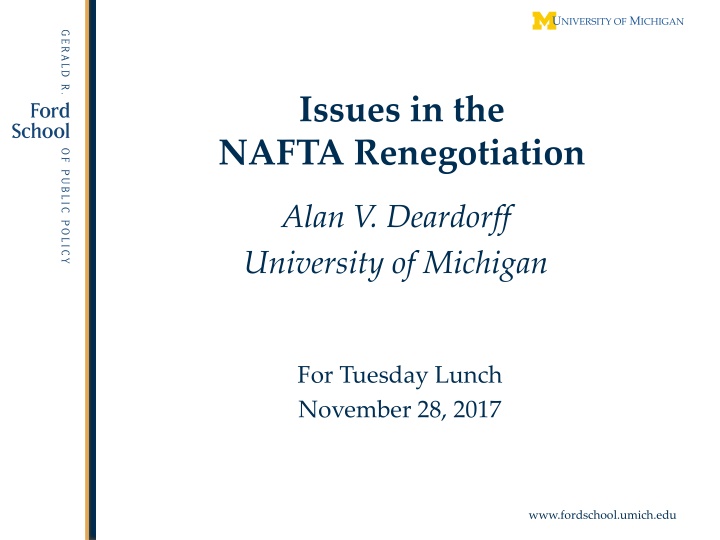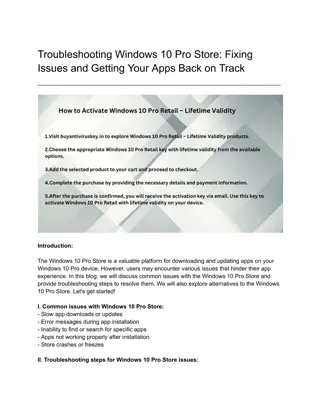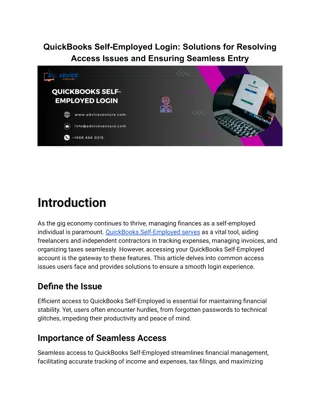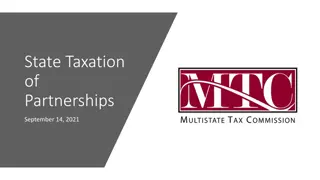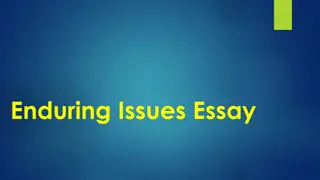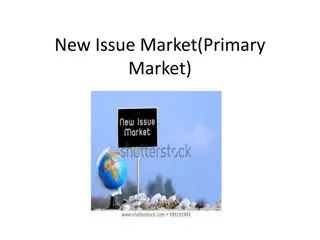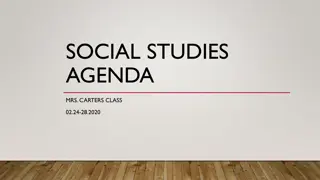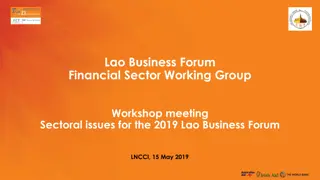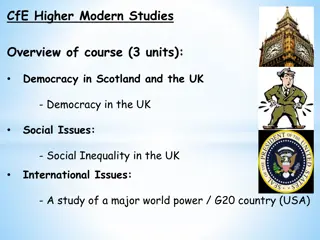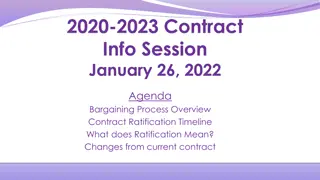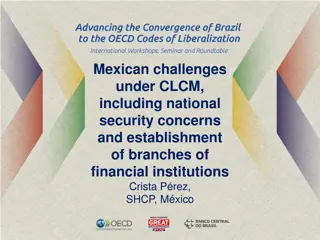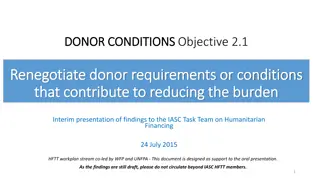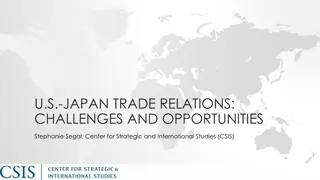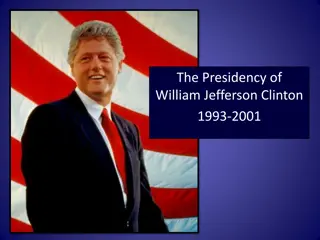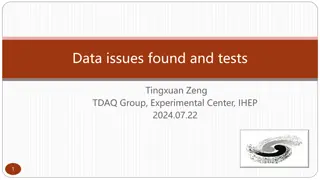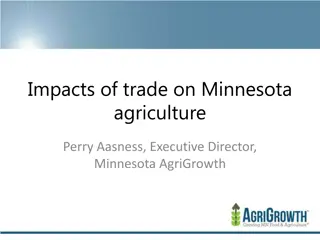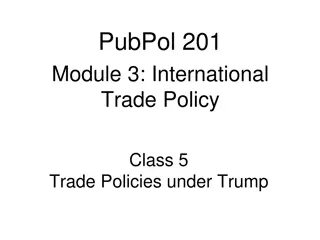NAFTA Renegotiation Issues Overview
The renegotiation of NAFTA, initiated by President Donald Trump in 2017, has been a significant topic of discussion. This content provides insights into the timeline, key issues, and prospects related to the renegotiation process involving the US, Canada, and Mexico. Topics covered include trade imbalances, duty-free market access, rules of origin, regulations, services, digital trade, labor standards, and more.
Uploaded on Mar 07, 2025 | 1 Views
Download Presentation

Please find below an Image/Link to download the presentation.
The content on the website is provided AS IS for your information and personal use only. It may not be sold, licensed, or shared on other websites without obtaining consent from the author.If you encounter any issues during the download, it is possible that the publisher has removed the file from their server.
You are allowed to download the files provided on this website for personal or commercial use, subject to the condition that they are used lawfully. All files are the property of their respective owners.
The content on the website is provided AS IS for your information and personal use only. It may not be sold, licensed, or shared on other websites without obtaining consent from the author.
E N D
Presentation Transcript
Issues in the NAFTA Renegotiation Alan V. Deardorff University of Michigan For Tuesday Lunch November 28, 2017 www.fordschool.umich.edu
Outline NAFTA What it is What have been its effects Renegotiation Timeline Issues Autos Prospects 2 www.fordschool.umich.edu
NAFTA Renegotiation Donald Trump Trump opposed NAFTA as early as 1993 The Mexicans want it, and that doesn't sound good to me. As candidate in 2016 The single worst trade deal ever approved in this country As President April 26: Threatened to pull out of NAFTA completely April 27: Decided not to, and to renegotiate instead May 18: Formally launched renegotiation 3 www.fordschool.umich.edu
NAFTA Renegotiation August 16: Negotiations began Round 1: Aug 16-20, Washington, D.C. Round 2: Sep 1-5, Mexico City Round 3: Sep 23-27, Ottawa Round 4: Oct 11-15, Washington, D.C. Round 5: Nov 17-21, Mexico City Round 6: Dec ?-?, Washington, D.C. (Meeting without the principals, who will meet next in late January in Montreal) 4 www.fordschool.umich.edu
Renegotiation Issues Issues (US) Trade imbalances Reciprocal duty- free market access Rules of origin Regulations Services Digital trade ISDS State-owned enterprises Labor standards Chapter 19 Procurement Currency manipulation 5 www.fordschool.umich.edu
Renegotiation Issues Issues (US) Trade imbalances Reciprocal duty- free market access Rules of origin Regulations Services Digital trade ISDS State-owned enterprises Labor standards Chapter 19 Procurement Currency manipulation 6 www.fordschool.umich.edu
Renegotiation Issues Other Issues (Canada) Gender rights Indigenous rights Freer movement of professionals Dairy & poultry Cultural exemptions 7 www.fordschool.umich.edu
Renegotiation Issues Other Issues (Mexico) Avoid increased US tariffs on Mexico s exports (80% of Mexico s exports are to the US) Anti-corruption Energy, financial services and telecommunications Guest worker program in US 8 www.fordschool.umich.edu
Renegotiation Issues US New Demands Sunset clause NAFTA should expire after 5 years if not renewed Seasonal restrictions on imports 9 www.fordschool.umich.edu
Issues in More Detail Trade imbalances The US top priority is to Improve the U.S. trade balance and reduce the trade deficit with the NAFTA countries. Possibility: trigger mechanism that raises tariffs if goal of reducing deficit is not met Most economists agree that trade deficits Are not the result of trade policies Don t mean deficit country is losing Result from spending more than income 10 www.fordschool.umich.edu
Issues in More Detail Rules of origin USTR Lighthizer wants higher NAFTA content and substantial American content . That would be unprecedented in an FTA Raise auto ROO from 62.5% to 85% Also require 50% US content Higher ROO will disrupt supply chains that have grown across NAFTA countries, especially autos If too high, some producers will revert to sourcing from outside NAFTA 11 www.fordschool.umich.edu
How Tighter Rules of Origin Can Increase Imports From: Freund, Caroline, Streamlining Rules of Origin, Policy Brief 17-25, Peterson Institute for International Economics, June 2017. 12 www.fordschool.umich.edu
Issues in More Detail ISDS = Investor-State Dispute Settlement (Chapter 11 of NAFTA) U.S. has so far never lost an ISDS case Trump seems to want it retained (as do US large corporations) USTR wants to eliminate it (as does the AFL/CIO) 13 www.fordschool.umich.edu
Issues in More Detail Chapter 19 This now allows NAFTA countries an appeal against AD & CVD actions Canada insists on keeping it US wants it removed You can see why from the data below 14 www.fordschool.umich.edu
Targets of Chapter 19 Issues in More Detail 12 10 8 6 4 2 0 1995 1996 1997 1998 1999 2000 2001 2002 2003 2004 2005 2006 2007 2008 2009 2010 2011 2012 2013 2014 2015 2016 vs Canada vs Mexico vs US 15 www.fordschool.umich.edu
Users of Chapter 19 Issues in More Detail 9 8 7 6 5 4 3 2 1 0 2013 2016 1995 1996 1997 1998 1999 2000 2001 2002 2003 2004 2005 2006 2007 2008 2009 2010 2011 2012 2014 2015 by Canada by Mexico by US 16 www.fordschool.umich.edu
Issues in More Detail Dairy & poultry Canada wants to keep its supply management system for dairy and poultry Supply management allows farmers to act collectively to manage supply and price Canada has a 270% tariff on dairy imports (with a small quota tariff-free) This was exempted from liberalization in NAFTA 17 www.fordschool.umich.edu
Renegotiation Prospects US has included demands that some say are poison pills Demands that they know others cannot accept Is the purpose to get a better outcome (as they view it) for US? Or is the purpose to justify later pulling out of NAFTA? 18 www.fordschool.umich.edu
Renegotiation Prospects One thing I will confidently predict: The negotiations will be extended over time That has already begun, with the delay of Round 5 It is what has happened repeatedly with other trade negotiations Agreement will become harder, not easier as US approaches mid-term elections Mexico has presidential election 19 www.fordschool.umich.edu
